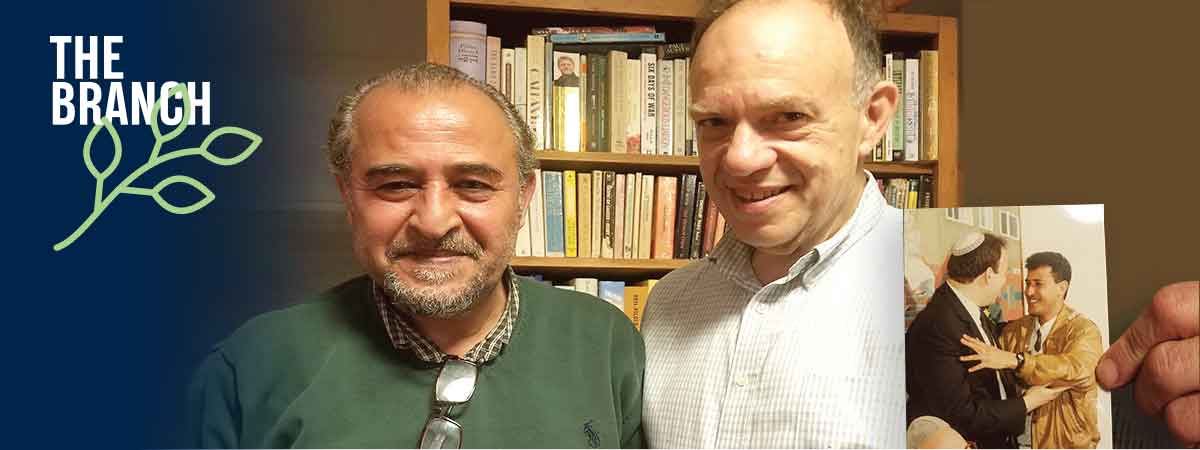Episode 10: From Gaza to Tel Aviv
Two journalists forged a 30-year friendship out of covering conflict, and today their families' lives are intertwined. Jonathan is a Jewish New Yorker who moved to Israel. Saud is a Gaza City native. This is their story.
Episode 10: The Journalists’ Story, from Gaza to Tel Aviv
When my son and I walk into the Tel Aviv apartment a few blocks from the beach where my friends Jonathan and Miriam live, their friend Saud is sitting on the couch and they're all catching up. Jonathan and Miriam first met in Jerusalem some thirty years ago when Jonathan, a Jewish American journalist, had started a posting as a foreign correspondent. And Jonathan met Saud, a fellow journalist, around the same time.
Dinner is cooking in the oven and soon we are all sitting down to Jonathan’s salmon and baked potatoes. It all seems so normal, but Saud is not just any dinner guest – he is a dinner guest who lives in the Gaza Strip. I can pretty much guarantee you he is one of the only Gaza residents, if not the only one, having dinner in the home of a family in Tel Aviv that night.
Most people who live in Israel don’t know people who live in Gaza and vice-versa.
Over a decade of sporadic cross-border rocket-fire and fighting between Israelis and Gazans has left most thinking of each other as adversaries. For Jonathan and Miriam’s Israeli neighbors in Tel Aviv – or anywhere in the country – the possibility of knowing Palestinians from Gaza as individuals is virtually non-existent.
Permits for Gazans to come into Israel are almost exclusively granted only to those coming in for medical treatment. But Saud is a veteran journalist and his employer, Bloomberg, occasionally arranges permits for him to meet his colleagues in Tel Aviv and Jerusalem.
Until recently, Jonathan also worked for Bloomberg. But Saud and Jonathan’s ties go way back – as in thirty years ago back – when Jonathan was the Jerusalem bureau chief for UPI, a news agency, and Saud was a new reporter in Gaza, working as a “fixer” for foreign correspondents. Fixers or stringers, as they are also called, arrange interviews, translate, and analyze political and security situations and act as a guide for these visiting reporters. Saud's first break was working for Bob Simon on an episode for 60 Minutes.
When Jonathan first met him, Saud was known, he jokes, “as the Palestinian Tom Hanks,” handsome and friendly with a head full of dark, wavy hair. Today that hair is thinning and gray. Both men are now in their 50s. After dinner, they pore over photo albums, including Jonathan’s wedding album, where the two of them appear. A few months earlier, Jonathan had been a guest at Saud’s wedding. Their kids were born at about the same time and their reporting and personal lives intersected against the backdrop of the Palestinian-Israeli conflict – including two Palestinian uprisings, the Oslo Peace Accord years, and three wars between Israel and Gaza.
They even took turns saving each other in different ways. When Yasser Arafat returned from exile to Gaza in 1994, massive crowds swelled into a soccer stadium and Jonathan nearly got crushed in the melee and fainted.
“I don't know if you just poured water all over my face or something, but you got me up and it was over. You took care of me and that's what always happened,” Jonathan says to Saud during our interview. “You know you take care of the people that that you work with. I always felt safe because you were with me, because I definitely would not have been safe without you.”
Those were intense news-filled days and Saud had stretches of not sleeping for almost three days straight. He subsisted on coffee and cigarettes. Eventually he collapsed and had a heart attack. It was Jonathan who helped arrange his transportation and catheterization surgery at Hadassah Medical Organization in Jerusalem.
Saud talks about Jonathan’s influence on him. “For me, he is like a big brother, a big teacher. You know I really owe him a lot. He is the one who taught me how to write. He's like my teacher. He's like the one who inspired me to get deeper into journalism.”
Sitting with Saud and Jonathan, story leads to story – from the time Saud took Jonathan’s Orthodox Jewish father from the Bronx to meet Arafat to their adventures reporting on smugglers running networks of tunnels underneath the Egyptian-Gazan border. Among the goods coming in were Viagra, iPhones and even Kentucky Fried Chicken. They speak of nostalgia for the days their kids swam at a Gaza beach club pool together, back when the peace process still looked promising.
Theirs is a unique friendship. Jonathan’s wife Miriam, listening in, describes the connection between their families as “a huge blessing … with the heartache that goes along with it.”
Go behind-the-scenes with host Dina Kraft: check out these photos from episode 10



